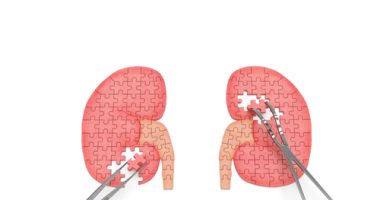Non-drug Treatments for Alport Syndrome
Dialysis
The kidneys perform many functions, but one of the most important is filtering the blood to remove waste products and fluid. In kidney disease, the kidneys cannot filter the blood effectively, resulting in the buildup of waste and fluid in the blood. Dialysis is a medical procedure that supports kidney function by removing waste products and fluid from the blood using a machine. There are two main types of dialysis: hemodialysis and peritoneal dialysis.
Kidney Transplant
People with Alport syndrome can develop chronic kidney disease, where the kidneys accumulate damage over time. Some patients may be eligible for an early, or pre-emptive, kidney transplant, before end-stage kidney disease develops, possibly avoiding the need for dialysis. A kidney transplant is a surgical procedure to replace the damaged kidneys with a healthy kidney from a donor.
Eye Surgery
Many people with Alport syndrome develop eye abnormalities during middle age or later. These abnormalities usually affect the retina (the light-sensitive tissue that lines the inside of the eye), the lens, and the cornea (the clear, dome-shaped surface that covers the front of the eye). Most eye problems can be managed using protective lenses but some patients may require eye surgery.
Speech Therapy
Speech and language therapy provides treatment, support, and care for children and adults who have difficulties with communication. Alport syndrome patients may begin losing their hearing before their language skills have fully developed. Language and speech therapists can work with children after diagnosis to develop language skills, making it easier for them to speak clearly and understand speech.






